PI240 Bioethics Essay: Utilitarian Approach to Genetic Enhancement
VerifiedAdded on 2022/09/13
|9
|3177
|12
Essay
AI Summary
This essay critically analyzes the role of utilitarianism in justifying genetic enhancement. It argues that utilitarianism, which prioritizes maximizing overall well-being, supports genetic enhancement as a means to improve individual and societal health and well-being. The essay explores the core tenets of utilitarianism, including the views of Bentham and Mill, and discusses how it aligns with genetic enhancement by potentially increasing intelligence, preventing diseases, and improving the quality of life. However, the essay also acknowledges counterarguments, particularly those rooted in deontology, which emphasizes moral rules and duties, and addresses concerns such as fairness and potential inequalities. The essay examines concepts like the unfair advantage argument and the impact of genetic testing, while also acknowledging the role of genetic enhancement in sports. Ultimately, the essay proposes that utilitarianism offers an effective framework for justifying genetic enhancement despite the challenges posed by deontological perspectives.
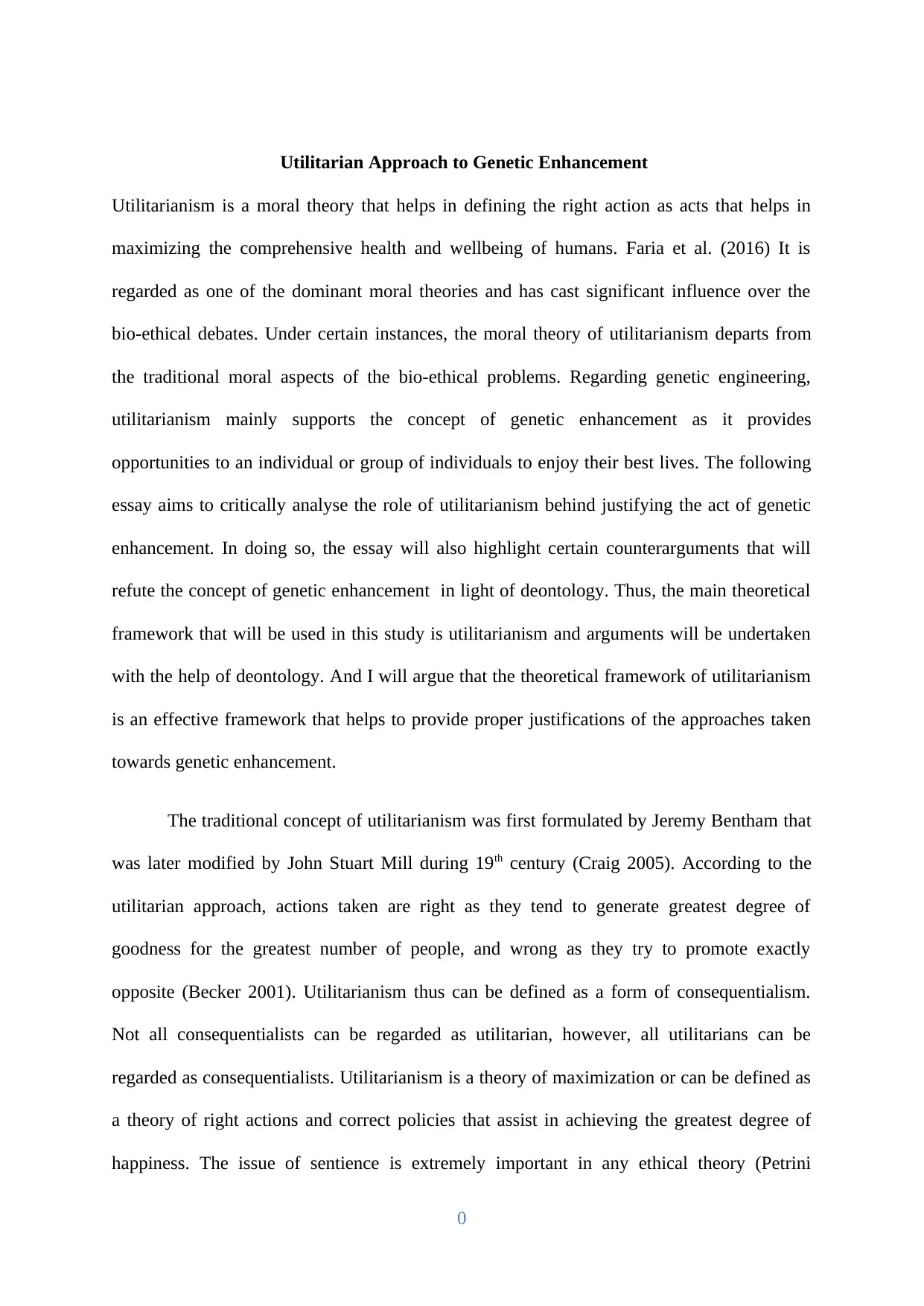
Utilitarian Approach to Genetic Enhancement
Utilitarianism is a moral theory that helps in defining the right action as acts that helps in
maximizing the comprehensive health and wellbeing of humans. Faria et al. (2016) It is
regarded as one of the dominant moral theories and has cast significant influence over the
bio-ethical debates. Under certain instances, the moral theory of utilitarianism departs from
the traditional moral aspects of the bio-ethical problems. Regarding genetic engineering,
utilitarianism mainly supports the concept of genetic enhancement as it provides
opportunities to an individual or group of individuals to enjoy their best lives. The following
essay aims to critically analyse the role of utilitarianism behind justifying the act of genetic
enhancement. In doing so, the essay will also highlight certain counterarguments that will
refute the concept of genetic enhancement in light of deontology. Thus, the main theoretical
framework that will be used in this study is utilitarianism and arguments will be undertaken
with the help of deontology. And I will argue that the theoretical framework of utilitarianism
is an effective framework that helps to provide proper justifications of the approaches taken
towards genetic enhancement.
The traditional concept of utilitarianism was first formulated by Jeremy Bentham that
was later modified by John Stuart Mill during 19th century (Craig 2005). According to the
utilitarian approach, actions taken are right as they tend to generate greatest degree of
goodness for the greatest number of people, and wrong as they try to promote exactly
opposite (Becker 2001). Utilitarianism thus can be defined as a form of consequentialism.
Not all consequentialists can be regarded as utilitarian, however, all utilitarians can be
regarded as consequentialists. Utilitarianism is a theory of maximization or can be defined as
a theory of right actions and correct policies that assist in achieving the greatest degree of
happiness. The issue of sentience is extremely important in any ethical theory (Petrini
0
Utilitarianism is a moral theory that helps in defining the right action as acts that helps in
maximizing the comprehensive health and wellbeing of humans. Faria et al. (2016) It is
regarded as one of the dominant moral theories and has cast significant influence over the
bio-ethical debates. Under certain instances, the moral theory of utilitarianism departs from
the traditional moral aspects of the bio-ethical problems. Regarding genetic engineering,
utilitarianism mainly supports the concept of genetic enhancement as it provides
opportunities to an individual or group of individuals to enjoy their best lives. The following
essay aims to critically analyse the role of utilitarianism behind justifying the act of genetic
enhancement. In doing so, the essay will also highlight certain counterarguments that will
refute the concept of genetic enhancement in light of deontology. Thus, the main theoretical
framework that will be used in this study is utilitarianism and arguments will be undertaken
with the help of deontology. And I will argue that the theoretical framework of utilitarianism
is an effective framework that helps to provide proper justifications of the approaches taken
towards genetic enhancement.
The traditional concept of utilitarianism was first formulated by Jeremy Bentham that
was later modified by John Stuart Mill during 19th century (Craig 2005). According to the
utilitarian approach, actions taken are right as they tend to generate greatest degree of
goodness for the greatest number of people, and wrong as they try to promote exactly
opposite (Becker 2001). Utilitarianism thus can be defined as a form of consequentialism.
Not all consequentialists can be regarded as utilitarian, however, all utilitarians can be
regarded as consequentialists. Utilitarianism is a theory of maximization or can be defined as
a theory of right actions and correct policies that assist in achieving the greatest degree of
happiness. The issue of sentience is extremely important in any ethical theory (Petrini
0
Paraphrase This Document
Need a fresh take? Get an instant paraphrase of this document with our AI Paraphraser
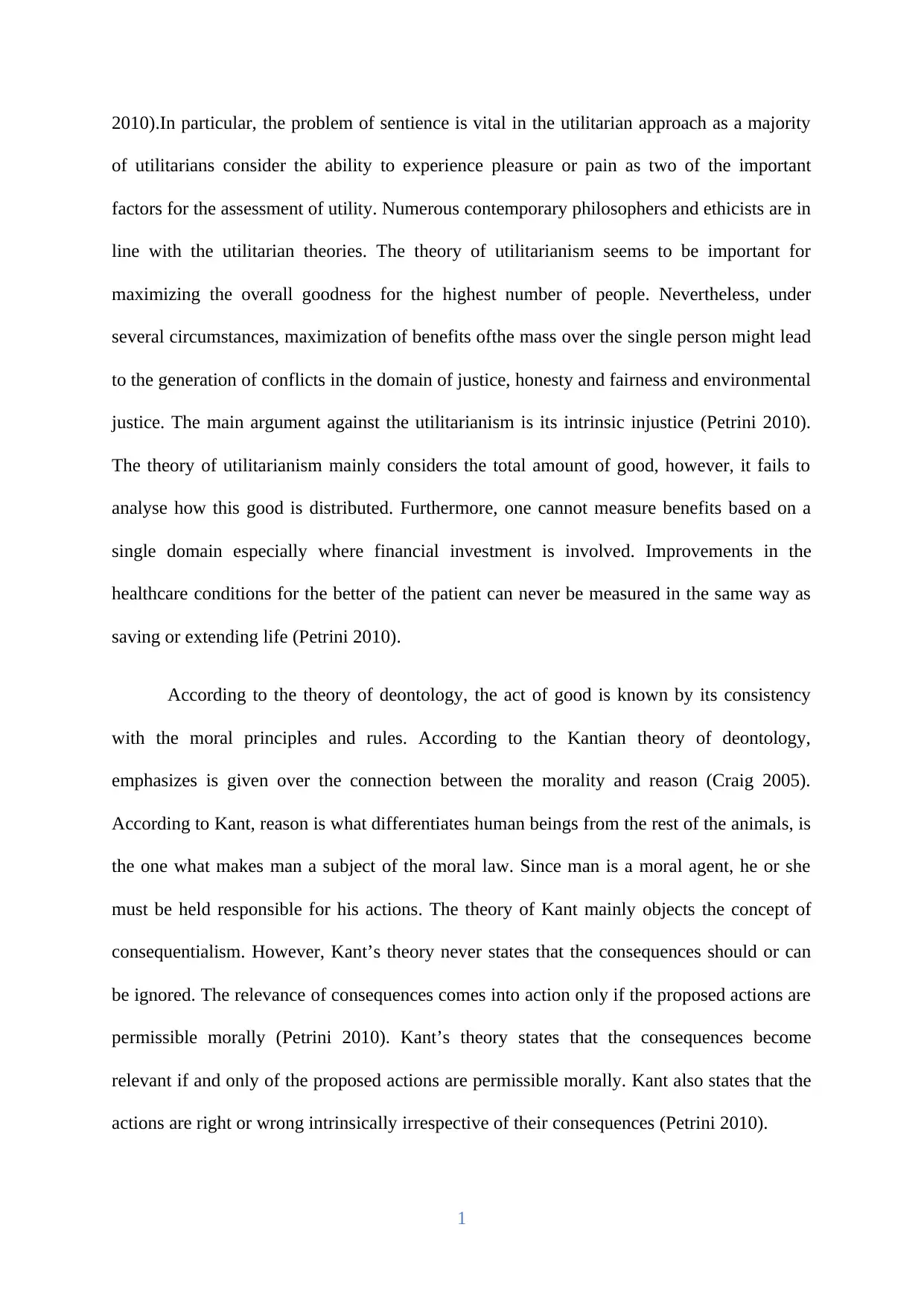
2010).In particular, the problem of sentience is vital in the utilitarian approach as a majority
of utilitarians consider the ability to experience pleasure or pain as two of the important
factors for the assessment of utility. Numerous contemporary philosophers and ethicists are in
line with the utilitarian theories. The theory of utilitarianism seems to be important for
maximizing the overall goodness for the highest number of people. Nevertheless, under
several circumstances, maximization of benefits ofthe mass over the single person might lead
to the generation of conflicts in the domain of justice, honesty and fairness and environmental
justice. The main argument against the utilitarianism is its intrinsic injustice (Petrini 2010).
The theory of utilitarianism mainly considers the total amount of good, however, it fails to
analyse how this good is distributed. Furthermore, one cannot measure benefits based on a
single domain especially where financial investment is involved. Improvements in the
healthcare conditions for the better of the patient can never be measured in the same way as
saving or extending life (Petrini 2010).
According to the theory of deontology, the act of good is known by its consistency
with the moral principles and rules. According to the Kantian theory of deontology,
emphasizes is given over the connection between the morality and reason (Craig 2005).
According to Kant, reason is what differentiates human beings from the rest of the animals, is
the one what makes man a subject of the moral law. Since man is a moral agent, he or she
must be held responsible for his actions. The theory of Kant mainly objects the concept of
consequentialism. However, Kant’s theory never states that the consequences should or can
be ignored. The relevance of consequences comes into action only if the proposed actions are
permissible morally (Petrini 2010). Kant’s theory states that the consequences become
relevant if and only of the proposed actions are permissible morally. Kant also states that the
actions are right or wrong intrinsically irrespective of their consequences (Petrini 2010).
1
of utilitarians consider the ability to experience pleasure or pain as two of the important
factors for the assessment of utility. Numerous contemporary philosophers and ethicists are in
line with the utilitarian theories. The theory of utilitarianism seems to be important for
maximizing the overall goodness for the highest number of people. Nevertheless, under
several circumstances, maximization of benefits ofthe mass over the single person might lead
to the generation of conflicts in the domain of justice, honesty and fairness and environmental
justice. The main argument against the utilitarianism is its intrinsic injustice (Petrini 2010).
The theory of utilitarianism mainly considers the total amount of good, however, it fails to
analyse how this good is distributed. Furthermore, one cannot measure benefits based on a
single domain especially where financial investment is involved. Improvements in the
healthcare conditions for the better of the patient can never be measured in the same way as
saving or extending life (Petrini 2010).
According to the theory of deontology, the act of good is known by its consistency
with the moral principles and rules. According to the Kantian theory of deontology,
emphasizes is given over the connection between the morality and reason (Craig 2005).
According to Kant, reason is what differentiates human beings from the rest of the animals, is
the one what makes man a subject of the moral law. Since man is a moral agent, he or she
must be held responsible for his actions. The theory of Kant mainly objects the concept of
consequentialism. However, Kant’s theory never states that the consequences should or can
be ignored. The relevance of consequences comes into action only if the proposed actions are
permissible morally (Petrini 2010). Kant’s theory states that the consequences become
relevant if and only of the proposed actions are permissible morally. Kant also states that the
actions are right or wrong intrinsically irrespective of their consequences (Petrini 2010).
1
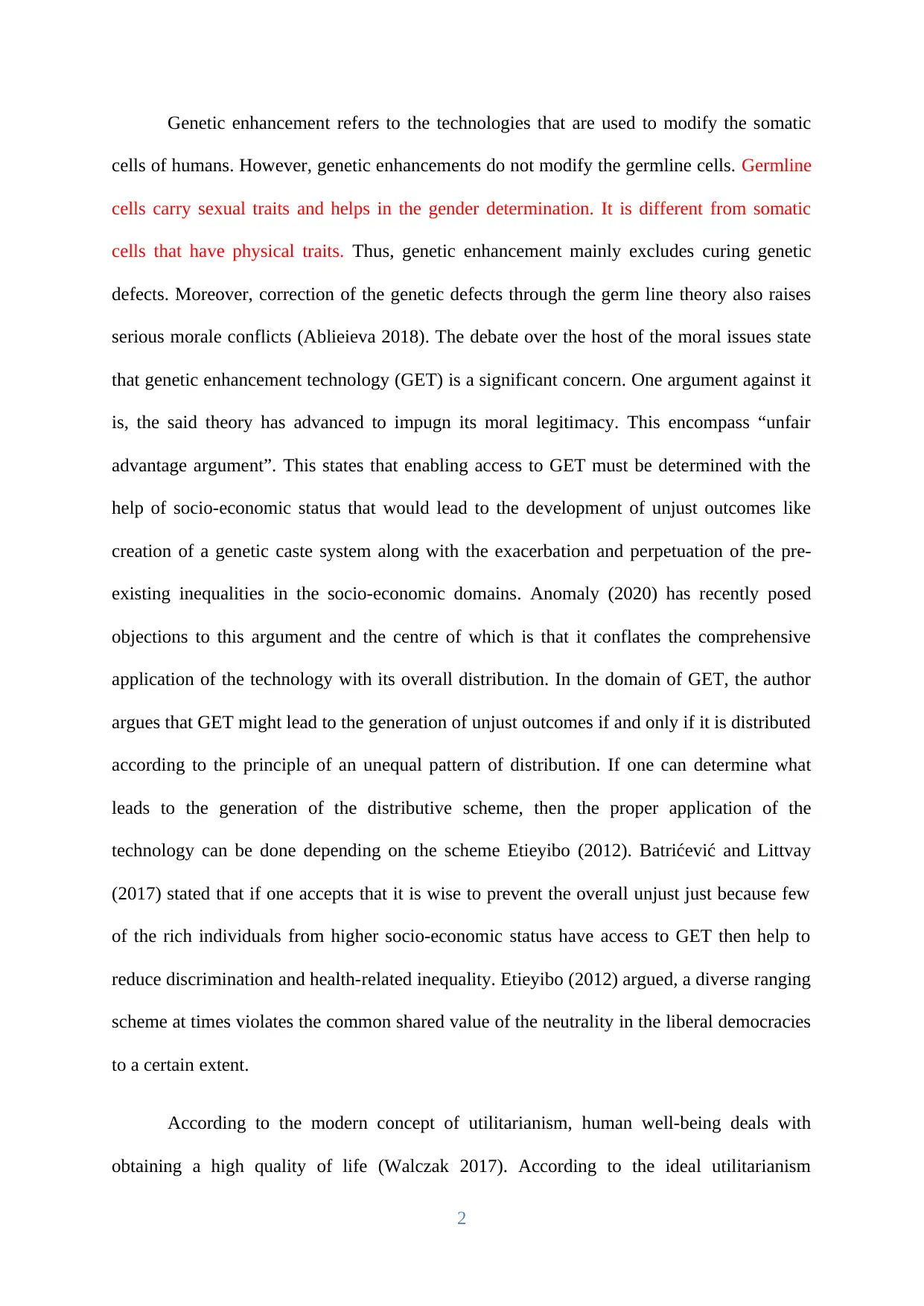
Genetic enhancement refers to the technologies that are used to modify the somatic
cells of humans. However, genetic enhancements do not modify the germline cells. Germline
cells carry sexual traits and helps in the gender determination. It is different from somatic
cells that have physical traits. Thus, genetic enhancement mainly excludes curing genetic
defects. Moreover, correction of the genetic defects through the germ line theory also raises
serious morale conflicts (Ablieieva 2018). The debate over the host of the moral issues state
that genetic enhancement technology (GET) is a significant concern. One argument against it
is, the said theory has advanced to impugn its moral legitimacy. This encompass “unfair
advantage argument”. This states that enabling access to GET must be determined with the
help of socio-economic status that would lead to the development of unjust outcomes like
creation of a genetic caste system along with the exacerbation and perpetuation of the pre-
existing inequalities in the socio-economic domains. Anomaly (2020) has recently posed
objections to this argument and the centre of which is that it conflates the comprehensive
application of the technology with its overall distribution. In the domain of GET, the author
argues that GET might lead to the generation of unjust outcomes if and only if it is distributed
according to the principle of an unequal pattern of distribution. If one can determine what
leads to the generation of the distributive scheme, then the proper application of the
technology can be done depending on the scheme Etieyibo (2012). Batrićević and Littvay
(2017) stated that if one accepts that it is wise to prevent the overall unjust just because few
of the rich individuals from higher socio-economic status have access to GET then help to
reduce discrimination and health-related inequality. Etieyibo (2012) argued, a diverse ranging
scheme at times violates the common shared value of the neutrality in the liberal democracies
to a certain extent.
According to the modern concept of utilitarianism, human well-being deals with
obtaining a high quality of life (Walczak 2017). According to the ideal utilitarianism
2
cells of humans. However, genetic enhancements do not modify the germline cells. Germline
cells carry sexual traits and helps in the gender determination. It is different from somatic
cells that have physical traits. Thus, genetic enhancement mainly excludes curing genetic
defects. Moreover, correction of the genetic defects through the germ line theory also raises
serious morale conflicts (Ablieieva 2018). The debate over the host of the moral issues state
that genetic enhancement technology (GET) is a significant concern. One argument against it
is, the said theory has advanced to impugn its moral legitimacy. This encompass “unfair
advantage argument”. This states that enabling access to GET must be determined with the
help of socio-economic status that would lead to the development of unjust outcomes like
creation of a genetic caste system along with the exacerbation and perpetuation of the pre-
existing inequalities in the socio-economic domains. Anomaly (2020) has recently posed
objections to this argument and the centre of which is that it conflates the comprehensive
application of the technology with its overall distribution. In the domain of GET, the author
argues that GET might lead to the generation of unjust outcomes if and only if it is distributed
according to the principle of an unequal pattern of distribution. If one can determine what
leads to the generation of the distributive scheme, then the proper application of the
technology can be done depending on the scheme Etieyibo (2012). Batrićević and Littvay
(2017) stated that if one accepts that it is wise to prevent the overall unjust just because few
of the rich individuals from higher socio-economic status have access to GET then help to
reduce discrimination and health-related inequality. Etieyibo (2012) argued, a diverse ranging
scheme at times violates the common shared value of the neutrality in the liberal democracies
to a certain extent.
According to the modern concept of utilitarianism, human well-being deals with
obtaining a high quality of life (Walczak 2017). According to the ideal utilitarianism
2
⊘ This is a preview!⊘
Do you want full access?
Subscribe today to unlock all pages.

Trusted by 1+ million students worldwide
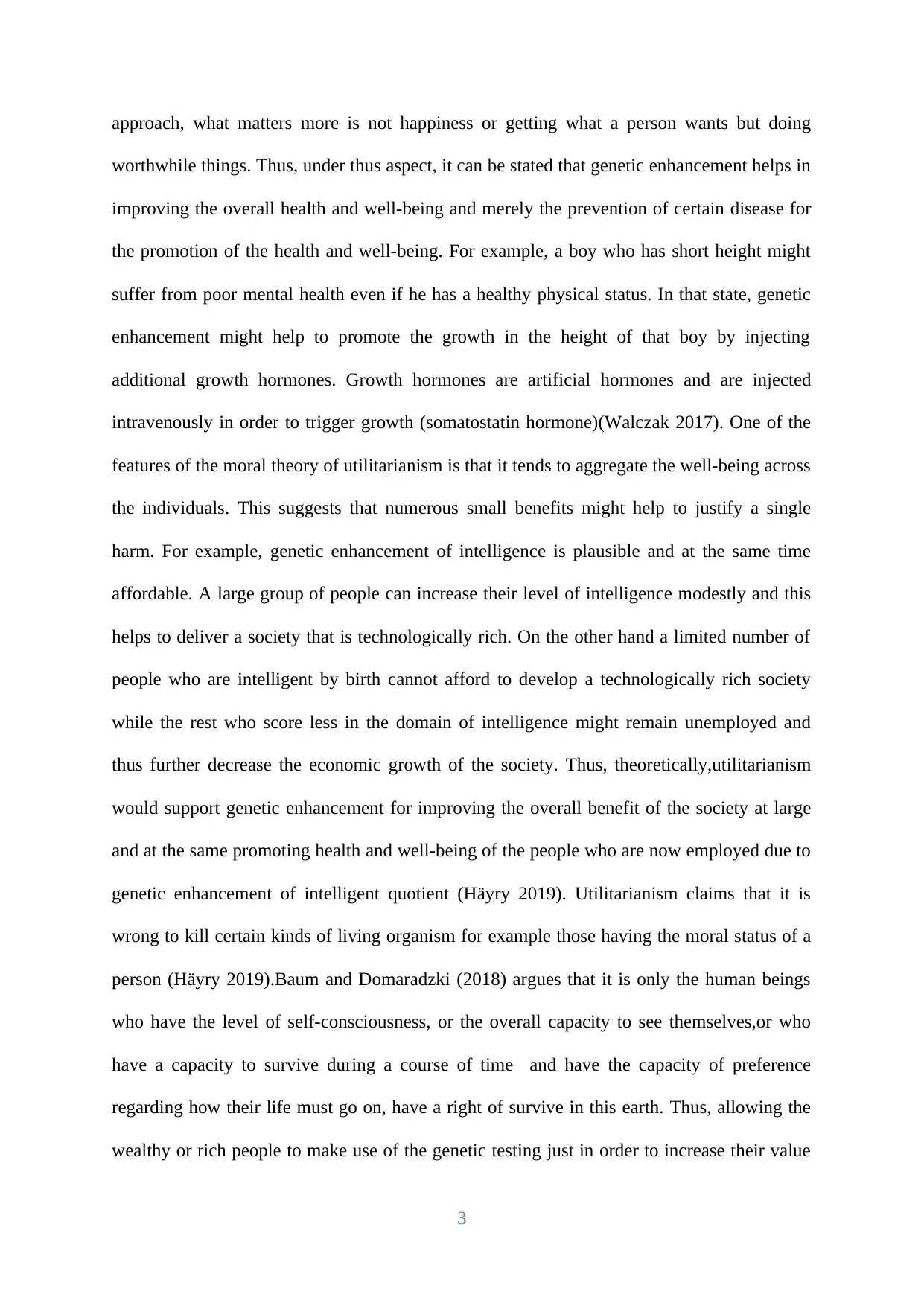
approach, what matters more is not happiness or getting what a person wants but doing
worthwhile things. Thus, under thus aspect, it can be stated that genetic enhancement helps in
improving the overall health and well-being and merely the prevention of certain disease for
the promotion of the health and well-being. For example, a boy who has short height might
suffer from poor mental health even if he has a healthy physical status. In that state, genetic
enhancement might help to promote the growth in the height of that boy by injecting
additional growth hormones. Growth hormones are artificial hormones and are injected
intravenously in order to trigger growth (somatostatin hormone)(Walczak 2017). One of the
features of the moral theory of utilitarianism is that it tends to aggregate the well-being across
the individuals. This suggests that numerous small benefits might help to justify a single
harm. For example, genetic enhancement of intelligence is plausible and at the same time
affordable. A large group of people can increase their level of intelligence modestly and this
helps to deliver a society that is technologically rich. On the other hand a limited number of
people who are intelligent by birth cannot afford to develop a technologically rich society
while the rest who score less in the domain of intelligence might remain unemployed and
thus further decrease the economic growth of the society. Thus, theoretically,utilitarianism
would support genetic enhancement for improving the overall benefit of the society at large
and at the same promoting health and well-being of the people who are now employed due to
genetic enhancement of intelligent quotient (Häyry 2019). Utilitarianism claims that it is
wrong to kill certain kinds of living organism for example those having the moral status of a
person (Häyry 2019).Baum and Domaradzki (2018) argues that it is only the human beings
who have the level of self-consciousness, or the overall capacity to see themselves,or who
have a capacity to survive during a course of time and have the capacity of preference
regarding how their life must go on, have a right of survive in this earth. Thus, allowing the
wealthy or rich people to make use of the genetic testing just in order to increase their value
3
worthwhile things. Thus, under thus aspect, it can be stated that genetic enhancement helps in
improving the overall health and well-being and merely the prevention of certain disease for
the promotion of the health and well-being. For example, a boy who has short height might
suffer from poor mental health even if he has a healthy physical status. In that state, genetic
enhancement might help to promote the growth in the height of that boy by injecting
additional growth hormones. Growth hormones are artificial hormones and are injected
intravenously in order to trigger growth (somatostatin hormone)(Walczak 2017). One of the
features of the moral theory of utilitarianism is that it tends to aggregate the well-being across
the individuals. This suggests that numerous small benefits might help to justify a single
harm. For example, genetic enhancement of intelligence is plausible and at the same time
affordable. A large group of people can increase their level of intelligence modestly and this
helps to deliver a society that is technologically rich. On the other hand a limited number of
people who are intelligent by birth cannot afford to develop a technologically rich society
while the rest who score less in the domain of intelligence might remain unemployed and
thus further decrease the economic growth of the society. Thus, theoretically,utilitarianism
would support genetic enhancement for improving the overall benefit of the society at large
and at the same promoting health and well-being of the people who are now employed due to
genetic enhancement of intelligent quotient (Häyry 2019). Utilitarianism claims that it is
wrong to kill certain kinds of living organism for example those having the moral status of a
person (Häyry 2019).Baum and Domaradzki (2018) argues that it is only the human beings
who have the level of self-consciousness, or the overall capacity to see themselves,or who
have a capacity to survive during a course of time and have the capacity of preference
regarding how their life must go on, have a right of survive in this earth. Thus, allowing the
wealthy or rich people to make use of the genetic testing just in order to increase their value
3
Paraphrase This Document
Need a fresh take? Get an instant paraphrase of this document with our AI Paraphraser
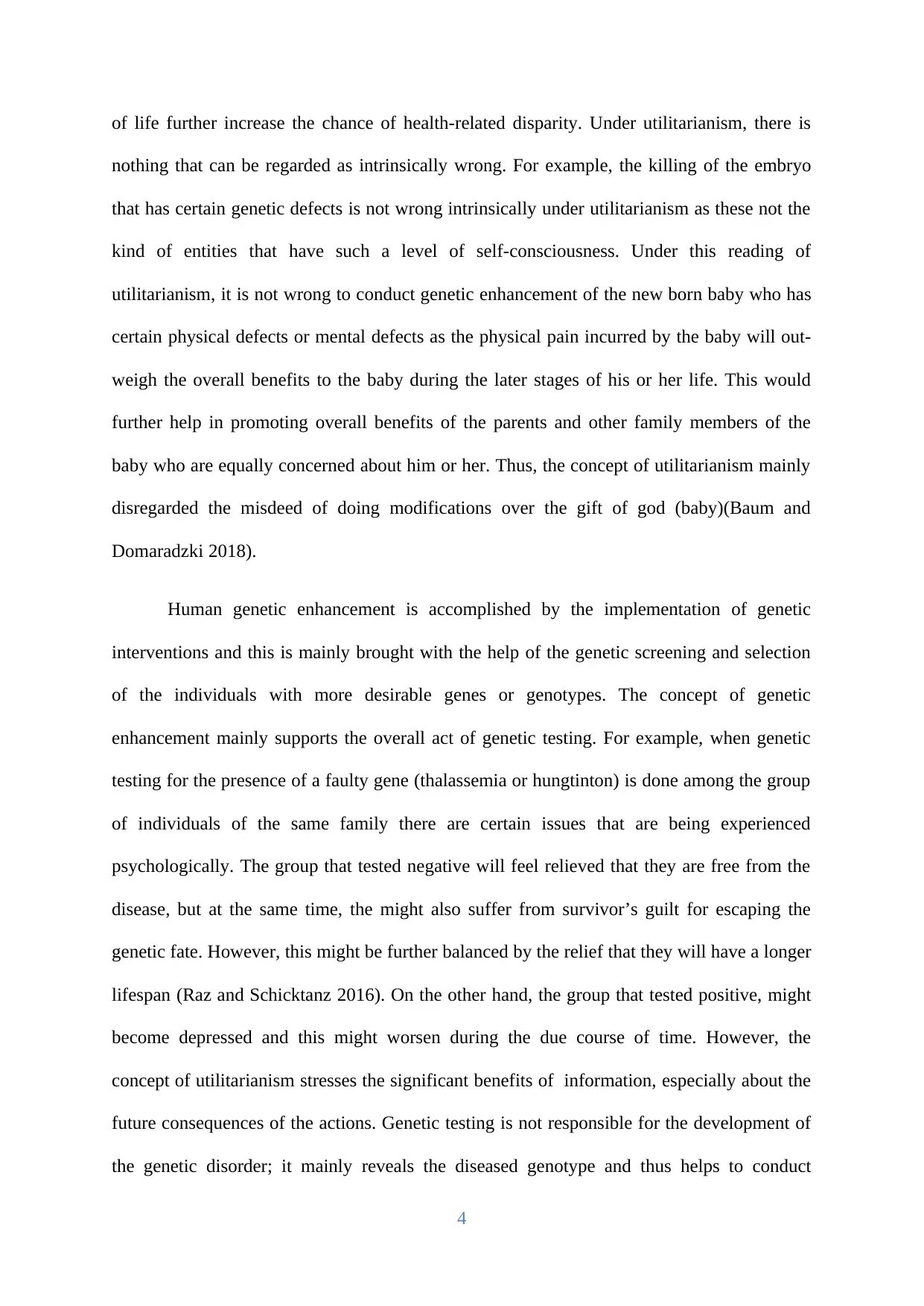
of life further increase the chance of health-related disparity. Under utilitarianism, there is
nothing that can be regarded as intrinsically wrong. For example, the killing of the embryo
that has certain genetic defects is not wrong intrinsically under utilitarianism as these not the
kind of entities that have such a level of self-consciousness. Under this reading of
utilitarianism, it is not wrong to conduct genetic enhancement of the new born baby who has
certain physical defects or mental defects as the physical pain incurred by the baby will out-
weigh the overall benefits to the baby during the later stages of his or her life. This would
further help in promoting overall benefits of the parents and other family members of the
baby who are equally concerned about him or her. Thus, the concept of utilitarianism mainly
disregarded the misdeed of doing modifications over the gift of god (baby)(Baum and
Domaradzki 2018).
Human genetic enhancement is accomplished by the implementation of genetic
interventions and this is mainly brought with the help of the genetic screening and selection
of the individuals with more desirable genes or genotypes. The concept of genetic
enhancement mainly supports the overall act of genetic testing. For example, when genetic
testing for the presence of a faulty gene (thalassemia or hungtinton) is done among the group
of individuals of the same family there are certain issues that are being experienced
psychologically. The group that tested negative will feel relieved that they are free from the
disease, but at the same time, the might also suffer from survivor’s guilt for escaping the
genetic fate. However, this might be further balanced by the relief that they will have a longer
lifespan (Raz and Schicktanz 2016). On the other hand, the group that tested positive, might
become depressed and this might worsen during the due course of time. However, the
concept of utilitarianism stresses the significant benefits of information, especially about the
future consequences of the actions. Genetic testing is not responsible for the development of
the genetic disorder; it mainly reveals the diseased genotype and thus helps to conduct
4
nothing that can be regarded as intrinsically wrong. For example, the killing of the embryo
that has certain genetic defects is not wrong intrinsically under utilitarianism as these not the
kind of entities that have such a level of self-consciousness. Under this reading of
utilitarianism, it is not wrong to conduct genetic enhancement of the new born baby who has
certain physical defects or mental defects as the physical pain incurred by the baby will out-
weigh the overall benefits to the baby during the later stages of his or her life. This would
further help in promoting overall benefits of the parents and other family members of the
baby who are equally concerned about him or her. Thus, the concept of utilitarianism mainly
disregarded the misdeed of doing modifications over the gift of god (baby)(Baum and
Domaradzki 2018).
Human genetic enhancement is accomplished by the implementation of genetic
interventions and this is mainly brought with the help of the genetic screening and selection
of the individuals with more desirable genes or genotypes. The concept of genetic
enhancement mainly supports the overall act of genetic testing. For example, when genetic
testing for the presence of a faulty gene (thalassemia or hungtinton) is done among the group
of individuals of the same family there are certain issues that are being experienced
psychologically. The group that tested negative will feel relieved that they are free from the
disease, but at the same time, the might also suffer from survivor’s guilt for escaping the
genetic fate. However, this might be further balanced by the relief that they will have a longer
lifespan (Raz and Schicktanz 2016). On the other hand, the group that tested positive, might
become depressed and this might worsen during the due course of time. However, the
concept of utilitarianism stresses the significant benefits of information, especially about the
future consequences of the actions. Genetic testing is not responsible for the development of
the genetic disorder; it mainly reveals the diseased genotype and thus helps to conduct
4
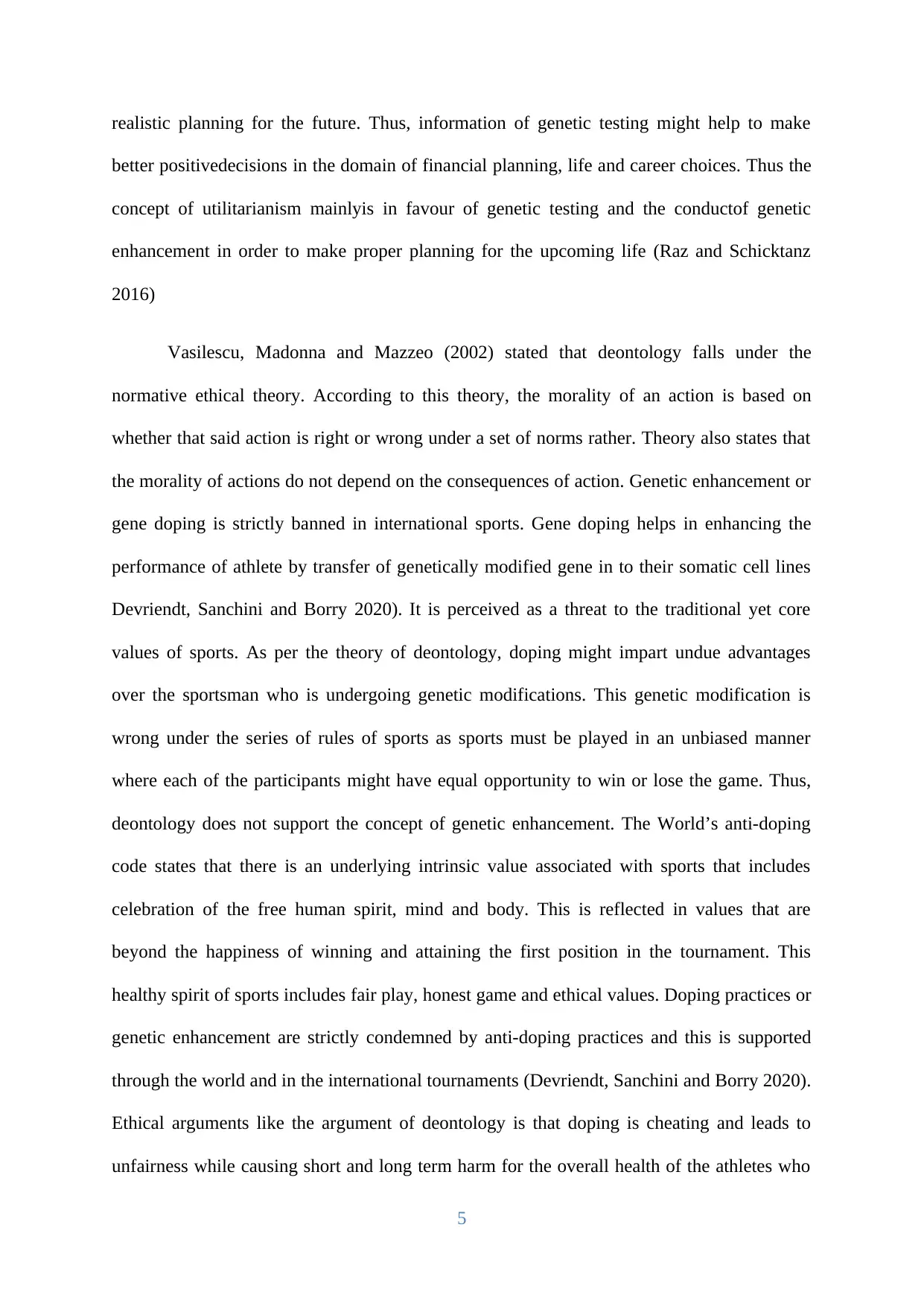
realistic planning for the future. Thus, information of genetic testing might help to make
better positivedecisions in the domain of financial planning, life and career choices. Thus the
concept of utilitarianism mainlyis in favour of genetic testing and the conductof genetic
enhancement in order to make proper planning for the upcoming life (Raz and Schicktanz
2016)
Vasilescu, Madonna and Mazzeo (2002) stated that deontology falls under the
normative ethical theory. According to this theory, the morality of an action is based on
whether that said action is right or wrong under a set of norms rather. Theory also states that
the morality of actions do not depend on the consequences of action. Genetic enhancement or
gene doping is strictly banned in international sports. Gene doping helps in enhancing the
performance of athlete by transfer of genetically modified gene in to their somatic cell lines
Devriendt, Sanchini and Borry 2020). It is perceived as a threat to the traditional yet core
values of sports. As per the theory of deontology, doping might impart undue advantages
over the sportsman who is undergoing genetic modifications. This genetic modification is
wrong under the series of rules of sports as sports must be played in an unbiased manner
where each of the participants might have equal opportunity to win or lose the game. Thus,
deontology does not support the concept of genetic enhancement. The World’s anti-doping
code states that there is an underlying intrinsic value associated with sports that includes
celebration of the free human spirit, mind and body. This is reflected in values that are
beyond the happiness of winning and attaining the first position in the tournament. This
healthy spirit of sports includes fair play, honest game and ethical values. Doping practices or
genetic enhancement are strictly condemned by anti-doping practices and this is supported
through the world and in the international tournaments (Devriendt, Sanchini and Borry 2020).
Ethical arguments like the argument of deontology is that doping is cheating and leads to
unfairness while causing short and long term harm for the overall health of the athletes who
5
better positivedecisions in the domain of financial planning, life and career choices. Thus the
concept of utilitarianism mainlyis in favour of genetic testing and the conductof genetic
enhancement in order to make proper planning for the upcoming life (Raz and Schicktanz
2016)
Vasilescu, Madonna and Mazzeo (2002) stated that deontology falls under the
normative ethical theory. According to this theory, the morality of an action is based on
whether that said action is right or wrong under a set of norms rather. Theory also states that
the morality of actions do not depend on the consequences of action. Genetic enhancement or
gene doping is strictly banned in international sports. Gene doping helps in enhancing the
performance of athlete by transfer of genetically modified gene in to their somatic cell lines
Devriendt, Sanchini and Borry 2020). It is perceived as a threat to the traditional yet core
values of sports. As per the theory of deontology, doping might impart undue advantages
over the sportsman who is undergoing genetic modifications. This genetic modification is
wrong under the series of rules of sports as sports must be played in an unbiased manner
where each of the participants might have equal opportunity to win or lose the game. Thus,
deontology does not support the concept of genetic enhancement. The World’s anti-doping
code states that there is an underlying intrinsic value associated with sports that includes
celebration of the free human spirit, mind and body. This is reflected in values that are
beyond the happiness of winning and attaining the first position in the tournament. This
healthy spirit of sports includes fair play, honest game and ethical values. Doping practices or
genetic enhancement are strictly condemned by anti-doping practices and this is supported
through the world and in the international tournaments (Devriendt, Sanchini and Borry 2020).
Ethical arguments like the argument of deontology is that doping is cheating and leads to
unfairness while causing short and long term harm for the overall health of the athletes who
5
⊘ This is a preview!⊘
Do you want full access?
Subscribe today to unlock all pages.

Trusted by 1+ million students worldwide
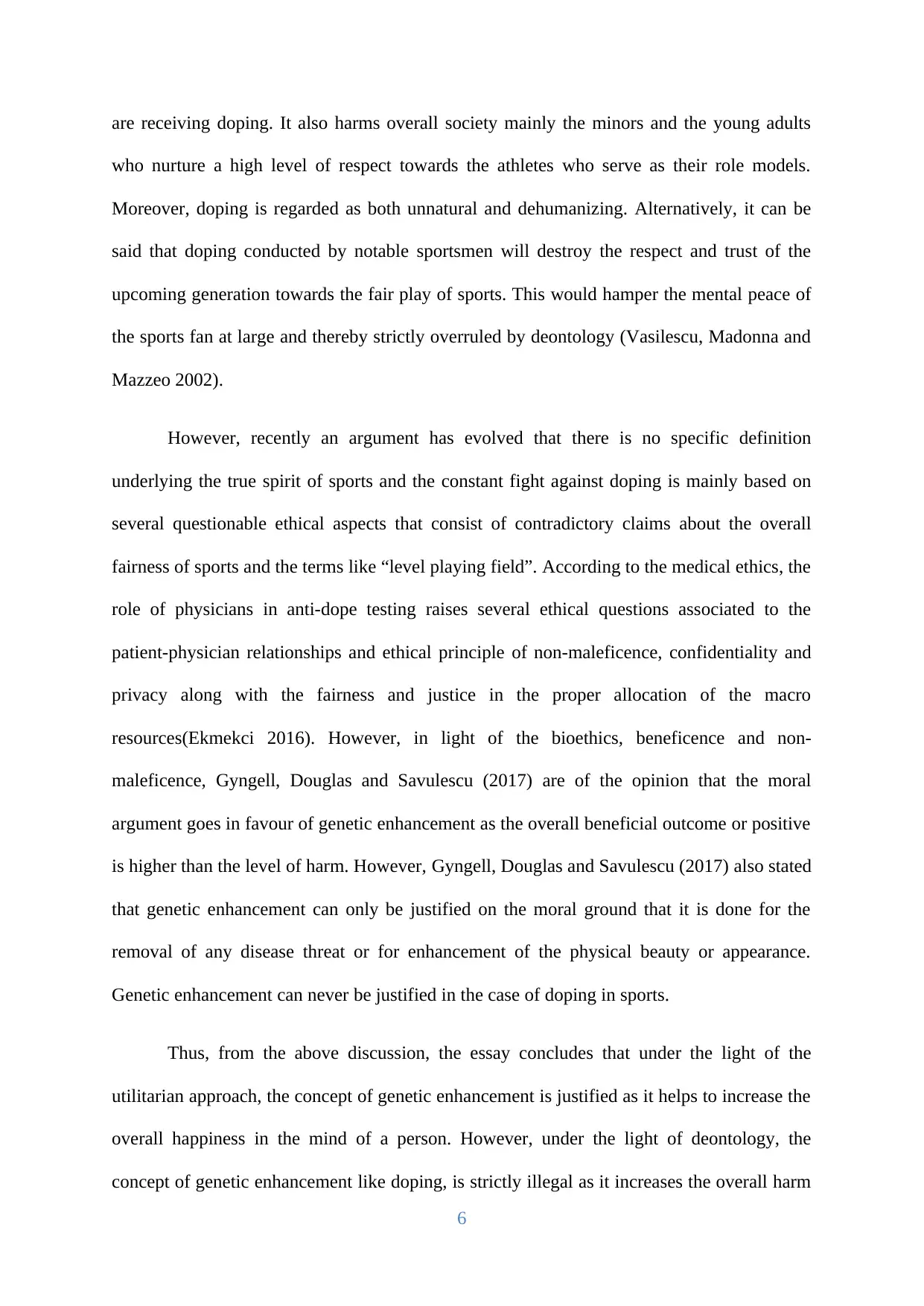
are receiving doping. It also harms overall society mainly the minors and the young adults
who nurture a high level of respect towards the athletes who serve as their role models.
Moreover, doping is regarded as both unnatural and dehumanizing. Alternatively, it can be
said that doping conducted by notable sportsmen will destroy the respect and trust of the
upcoming generation towards the fair play of sports. This would hamper the mental peace of
the sports fan at large and thereby strictly overruled by deontology (Vasilescu, Madonna and
Mazzeo 2002).
However, recently an argument has evolved that there is no specific definition
underlying the true spirit of sports and the constant fight against doping is mainly based on
several questionable ethical aspects that consist of contradictory claims about the overall
fairness of sports and the terms like “level playing field”. According to the medical ethics, the
role of physicians in anti-dope testing raises several ethical questions associated to the
patient-physician relationships and ethical principle of non-maleficence, confidentiality and
privacy along with the fairness and justice in the proper allocation of the macro
resources(Ekmekci 2016). However, in light of the bioethics, beneficence and non-
maleficence, Gyngell, Douglas and Savulescu (2017) are of the opinion that the moral
argument goes in favour of genetic enhancement as the overall beneficial outcome or positive
is higher than the level of harm. However, Gyngell, Douglas and Savulescu (2017) also stated
that genetic enhancement can only be justified on the moral ground that it is done for the
removal of any disease threat or for enhancement of the physical beauty or appearance.
Genetic enhancement can never be justified in the case of doping in sports.
Thus, from the above discussion, the essay concludes that under the light of the
utilitarian approach, the concept of genetic enhancement is justified as it helps to increase the
overall happiness in the mind of a person. However, under the light of deontology, the
concept of genetic enhancement like doping, is strictly illegal as it increases the overall harm
6
who nurture a high level of respect towards the athletes who serve as their role models.
Moreover, doping is regarded as both unnatural and dehumanizing. Alternatively, it can be
said that doping conducted by notable sportsmen will destroy the respect and trust of the
upcoming generation towards the fair play of sports. This would hamper the mental peace of
the sports fan at large and thereby strictly overruled by deontology (Vasilescu, Madonna and
Mazzeo 2002).
However, recently an argument has evolved that there is no specific definition
underlying the true spirit of sports and the constant fight against doping is mainly based on
several questionable ethical aspects that consist of contradictory claims about the overall
fairness of sports and the terms like “level playing field”. According to the medical ethics, the
role of physicians in anti-dope testing raises several ethical questions associated to the
patient-physician relationships and ethical principle of non-maleficence, confidentiality and
privacy along with the fairness and justice in the proper allocation of the macro
resources(Ekmekci 2016). However, in light of the bioethics, beneficence and non-
maleficence, Gyngell, Douglas and Savulescu (2017) are of the opinion that the moral
argument goes in favour of genetic enhancement as the overall beneficial outcome or positive
is higher than the level of harm. However, Gyngell, Douglas and Savulescu (2017) also stated
that genetic enhancement can only be justified on the moral ground that it is done for the
removal of any disease threat or for enhancement of the physical beauty or appearance.
Genetic enhancement can never be justified in the case of doping in sports.
Thus, from the above discussion, the essay concludes that under the light of the
utilitarian approach, the concept of genetic enhancement is justified as it helps to increase the
overall happiness in the mind of a person. However, under the light of deontology, the
concept of genetic enhancement like doping, is strictly illegal as it increases the overall harm
6
Paraphrase This Document
Need a fresh take? Get an instant paraphrase of this document with our AI Paraphraser

to the mass for the benefit of a single person or a single group of individuals. At the end, it
can be said that the act of genetic enhancement under genetic engineering can be permissible
for the purpose of improving the physical appearance and detection of a diseased gene but
can never be practiced to enjoy undue benefits in global affairs like in sports.
7
can be said that the act of genetic enhancement under genetic engineering can be permissible
for the purpose of improving the physical appearance and detection of a diseased gene but
can never be practiced to enjoy undue benefits in global affairs like in sports.
7
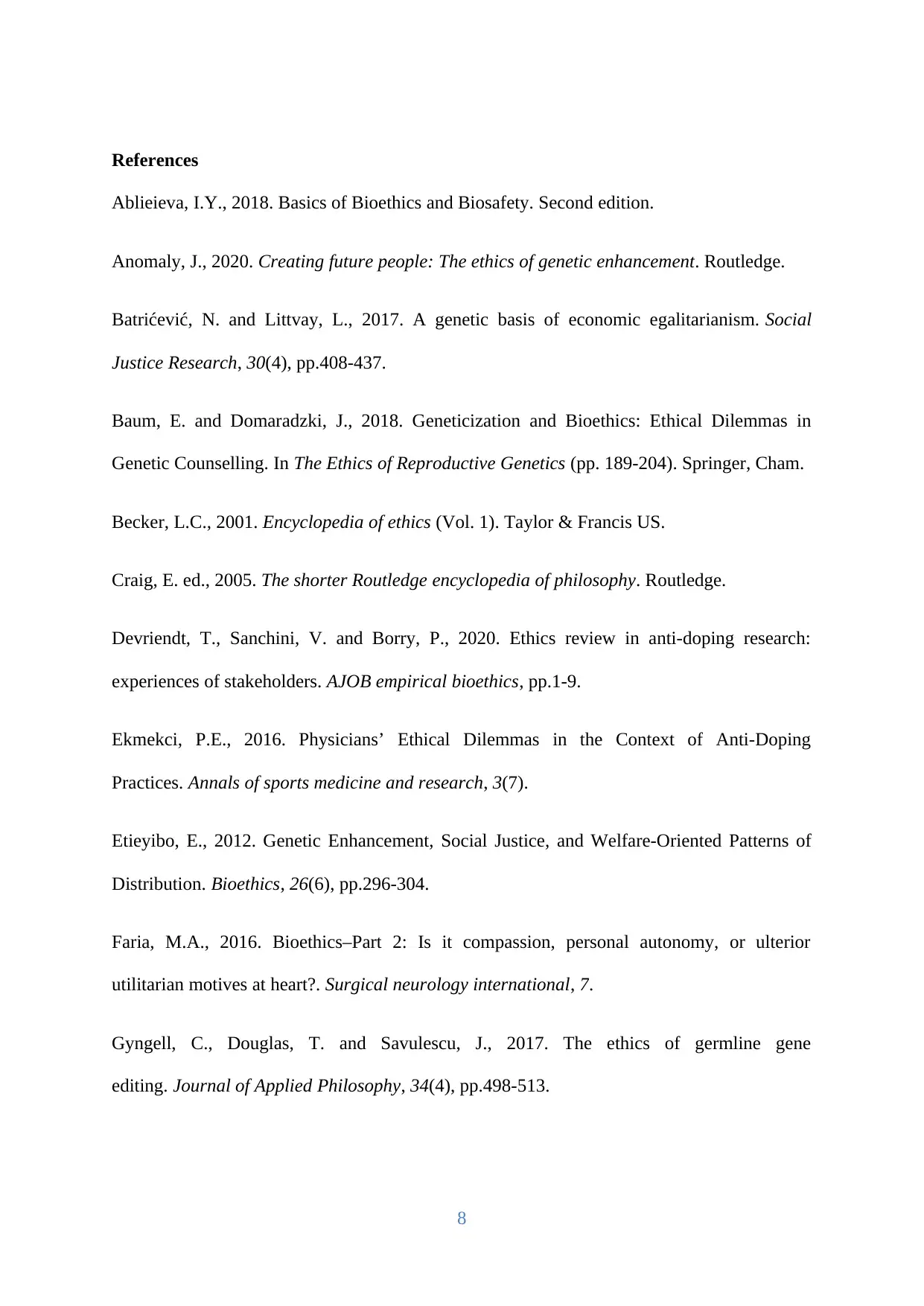
References
Ablieieva, I.Y., 2018. Basics of Bioethics and Biosafety. Second edition.
Anomaly, J., 2020. Creating future people: The ethics of genetic enhancement. Routledge.
Batrićević, N. and Littvay, L., 2017. A genetic basis of economic egalitarianism. Social
Justice Research, 30(4), pp.408-437.
Baum, E. and Domaradzki, J., 2018. Geneticization and Bioethics: Ethical Dilemmas in
Genetic Counselling. In The Ethics of Reproductive Genetics (pp. 189-204). Springer, Cham.
Becker, L.C., 2001. Encyclopedia of ethics (Vol. 1). Taylor & Francis US.
Craig, E. ed., 2005. The shorter Routledge encyclopedia of philosophy. Routledge.
Devriendt, T., Sanchini, V. and Borry, P., 2020. Ethics review in anti-doping research:
experiences of stakeholders. AJOB empirical bioethics, pp.1-9.
Ekmekci, P.E., 2016. Physicians’ Ethical Dilemmas in the Context of Anti-Doping
Practices. Annals of sports medicine and research, 3(7).
Etieyibo, E., 2012. Genetic Enhancement, Social Justice, and Welfare‐Oriented Patterns of
Distribution. Bioethics, 26(6), pp.296-304.
Faria, M.A., 2016. Bioethics–Part 2: Is it compassion, personal autonomy, or ulterior
utilitarian motives at heart?. Surgical neurology international, 7.
Gyngell, C., Douglas, T. and Savulescu, J., 2017. The ethics of germline gene
editing. Journal of Applied Philosophy, 34(4), pp.498-513.
8
Ablieieva, I.Y., 2018. Basics of Bioethics and Biosafety. Second edition.
Anomaly, J., 2020. Creating future people: The ethics of genetic enhancement. Routledge.
Batrićević, N. and Littvay, L., 2017. A genetic basis of economic egalitarianism. Social
Justice Research, 30(4), pp.408-437.
Baum, E. and Domaradzki, J., 2018. Geneticization and Bioethics: Ethical Dilemmas in
Genetic Counselling. In The Ethics of Reproductive Genetics (pp. 189-204). Springer, Cham.
Becker, L.C., 2001. Encyclopedia of ethics (Vol. 1). Taylor & Francis US.
Craig, E. ed., 2005. The shorter Routledge encyclopedia of philosophy. Routledge.
Devriendt, T., Sanchini, V. and Borry, P., 2020. Ethics review in anti-doping research:
experiences of stakeholders. AJOB empirical bioethics, pp.1-9.
Ekmekci, P.E., 2016. Physicians’ Ethical Dilemmas in the Context of Anti-Doping
Practices. Annals of sports medicine and research, 3(7).
Etieyibo, E., 2012. Genetic Enhancement, Social Justice, and Welfare‐Oriented Patterns of
Distribution. Bioethics, 26(6), pp.296-304.
Faria, M.A., 2016. Bioethics–Part 2: Is it compassion, personal autonomy, or ulterior
utilitarian motives at heart?. Surgical neurology international, 7.
Gyngell, C., Douglas, T. and Savulescu, J., 2017. The ethics of germline gene
editing. Journal of Applied Philosophy, 34(4), pp.498-513.
8
⊘ This is a preview!⊘
Do you want full access?
Subscribe today to unlock all pages.

Trusted by 1+ million students worldwide
1 out of 9
Related Documents
Your All-in-One AI-Powered Toolkit for Academic Success.
+13062052269
info@desklib.com
Available 24*7 on WhatsApp / Email
![[object Object]](/_next/static/media/star-bottom.7253800d.svg)
Unlock your academic potential
Copyright © 2020–2026 A2Z Services. All Rights Reserved. Developed and managed by ZUCOL.





